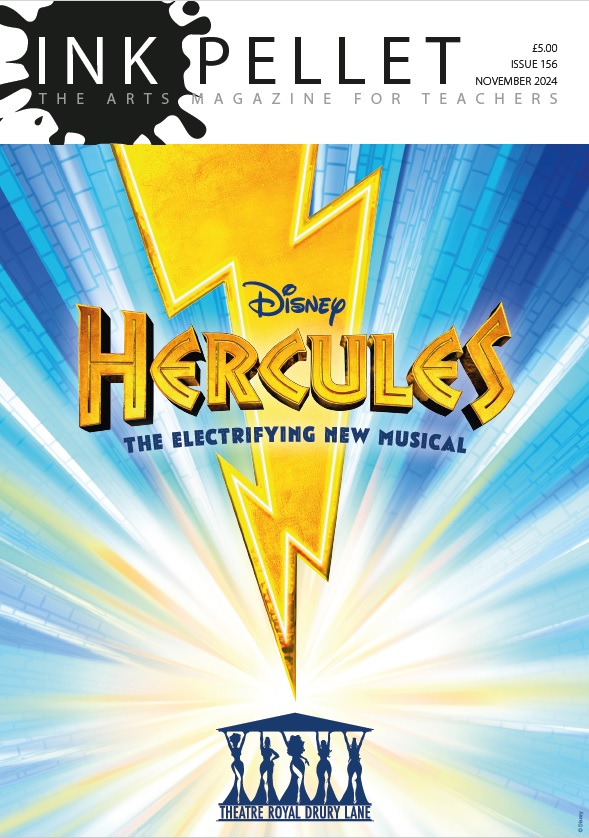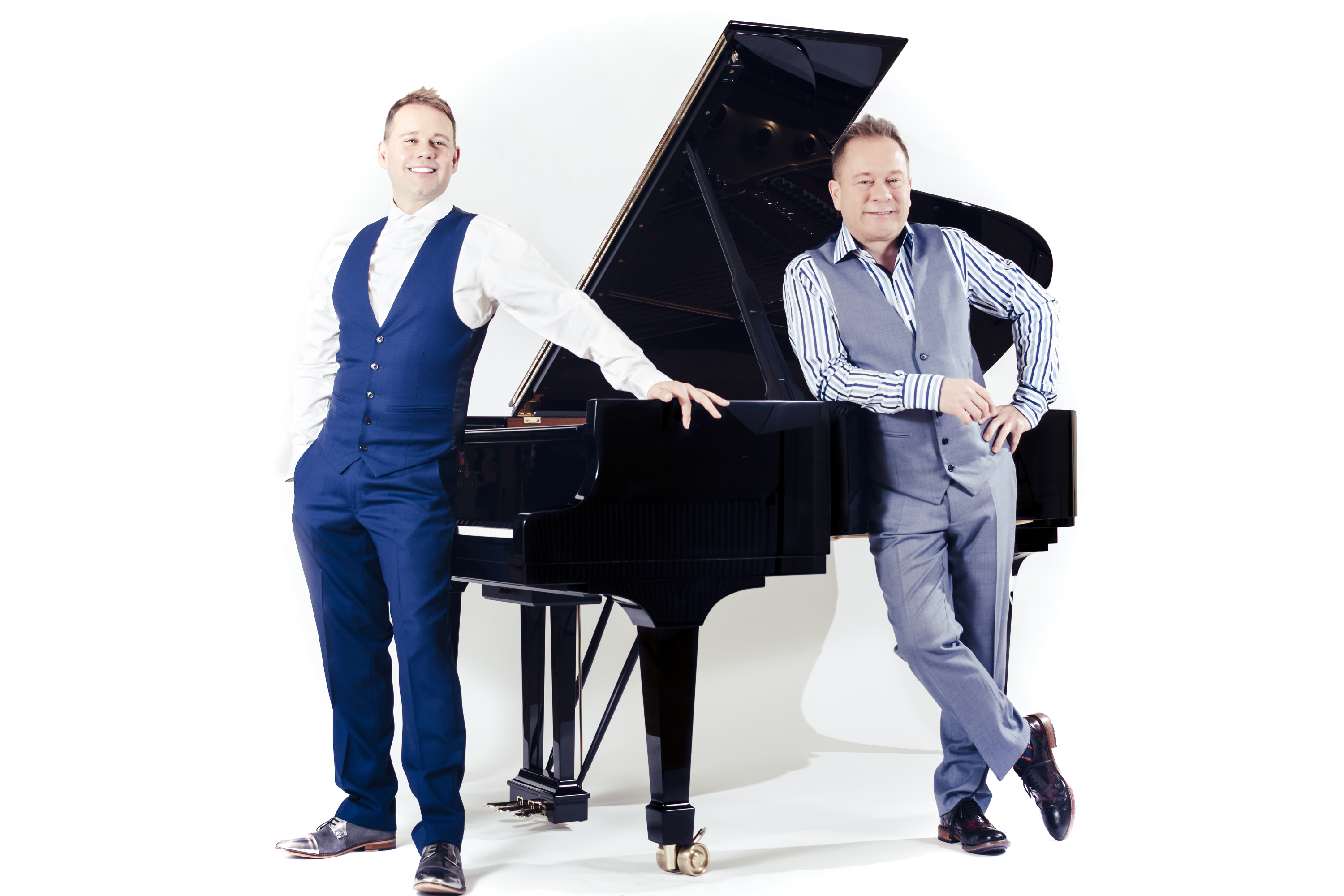Steven Worbey and Kevin Farrell, both pianists, met at Royal College of Music. Worbey and Farrell, their unusual double act – four hands on one piano – combines virtuosic playing with family-friendly humour. Susan Elkin caught up with them in London on their way home to Edinburgh following a working week on a P&O Cruise to Malaga.
We sit munching lunchtime sandwiches in the little café at Shakespeare’s Globe while this duo – an entertaining partnership in real life as well as on stage and at the keyboard – tell me about their work. I contacted them because I’d been very taken by a Sunday afternoon concert they did with Brighton Philharmonic Orchestra in March.
At Brighton Dome they played a Malcolm Arnold piano concerto, written for three hands on two pianos, which they’d arranged for four hands on a single instrument – once they’d warmed up the audience with a few jokes, so we were a long way from the usual rather po-faced feel of a classical music concert. Then after the interval, they performed Carnival of the Animals with the orchestra – each movement introduced by a very funny animal poem which Steven and Kevin had written. It was a concert brimming over with laughter and good humour and gave me a pretty good idea of their style.
They tell me now, to my surprise, that they’ve done very few orchestral concerts. “So we were nervous at Brighton. For me the scariest bit was the Asses in Carnival of the Animals” says Kevin. “Oh, for me it was the final section of the concerto” recalls Kevin adding that they had also done an open rehearsal for children in the morning which attracted an astonishing 900 children.
“We’d really like to do a lot more of that sort of work” says Kevin. “And the signs are encouraging. Barry Wordsworth, Conductor Laureate of Brighton Philharmonic and eminent freelance, wants to work with us again. And, on the back of that concert, the Malcolm Arnold Society have commissioned us to record both Arnold’s concertos, the St Trinian’s Suite and his 1957 Toy Symphony.”
So what do they do normally? “We do concerts which include pieces like Bach’s Tocata and Fugue and Tchaikovsky’s 1812 overture arranged for four hands – with lots of jokes” says Steven. “Our arrangements are so complex that they really now can’t be plagiarised” adds Kevin explaining that “You can create a whole cohesive orchestral effect on a piano if Steven becomes the strings and plays for example, block chords while I become the brass, woodwind and percussion.” They also write songs and would like to write a musical (Kevin is accomplished as both composer and orchestrator). And they joke about a show they did, originally for Edinburgh Festival but which also went elsewhere including a cruise on Cunard’s Queen Mary 2. “We called it Concerto without an Orchestra and we fooled the audience into thinking we had a live link with Edinburgh Symphony Orchestra but actually we’d pre-recorded it.”
It isn’t, they both say firmly a case of dumbing down the music. “Often it’s a case of creating and developing a new audience: people who might not normally come to a classical music concert” says Kevin. “If you start with something familiar and keep it cheerful, half an hour later you can introduce them to Messiaen.”
“In the past we’ve done a lot of cruising with shows which is lucrative and enjoyable but it takes up a big block of time so we do less of that now” says Steven. “We have more ideas than we have time to develop so we can’t spend a week at sea for a single concert too often. There’s nowhere for personal practice on a cruise ship either and we do both still need to do that every day as well as rehearsing together.” They are certainly brimming over with imaginative thoughts – bouncing them off each other and me continuously during the whole of our conversation.
Both men have been playing the piano since infancy and each relied more on ear than conventional notation at the outset. “I had a piano teacher from age 4 but she was a bit of a monster” says Kevin. “She would play me the piece and because I had a good ear I’d do it – and my ear got ever better. Then at age 11 I had a new teacher who slammed the piano shut and said ‘We’re not opening it again until you’ve learned to read music’. He’d rumbled me!” This, he points out means that he has maintained that very useful ear but that he had to work hard, at the beginning, at sight reading.
Steven, whose grandfather was a jazz pianist, tells a similar story. “My grandfather showed me what to do and I didn’t have a proper lesson until I was 12. Then I was horrified to discover that piano music is written on two separate staves for the right and the left hand and that the notes on each are different. I had an excellent piano teacher at school and by the time I got into the Royal College I was dead set on being a concert pianist like Ashkenazy or Horowitz. I didn’t realise that the air’s a bit thin up there!”
Kevin was a year ahead of Steven at college where they were casual friends. Upon leaving they went their separate ways. Steven did some touring and concert work along with a bit of acting. Kevin, a Victor Borge fan who’d always wanted to lighten things up, meanwhile, was making tentative plans to form a double act with someone else. “We met occasionally and there were a lot of coincidences which threw us together” recalls Steven.
Then came a day in 2002 when they found themselves in someone else’s flat and a mix-up with keys meant they couldn’t go out. “We were effectively trapped in the flat so we drank lots of wine, got a bit drunk and started messing about on the piano” grins Steven. “It gelled” says Kevin. I realised that we had a rapport that I wasn’t going to find with anyone else. I went to see Steven performing in Edinburgh and we started meeting to rehearse.
“Steinway Hall was one of the places we used” recalls Kevin. “And the staff loved what we were doing because we were different”. They laugh that one of the things they had fun with there was doing Rachmaninov’s notoriously difficult D minor piano concerto in D major. “We thought it could do with a bit of cheering up” quips Steven.
The result of all this was that veteran Hungarian pianist and conductor Tamas Vasary happened to be passing and liked what he heard. Mr Fazioli, Italian piano maker, spotted them too. “You have to own a Steinway to become an accredited Steinway artist” says Kevin telling me that Steinway Hall offered to sell them a piano for a penny so that they’d qualify. “It’s seals of approval like that which make all the difference.”
At home they have one baby grand piano and one digital piano in different rooms. “That means we can practise separately but most of the time we rehearse four hands on one or the other” explains Steven.
Meeting Geoffrey Durham, the late Victoria Wood’s husband until 2002, was a big turning point for Steven and Kevin. “He came to see our show and said that it was a bit muddled” says Kevin. “Geoffrey directed most of Victoria’s work and he’s absolutely clued up about comedy, classical music, words, drama – the lot”.
Durham, who now advises and directs Worbey and Farrell, told them that their comedy had to be at the same level as their music which encouraged them to raise their game. “He tells us that we have to give the audience what it wants but on our own terms”, says Steven and that’s clearly what they now do – as I saw in Brighton.
Meanwhile Steven and Kevin mull over more and more ideas. “We’d love to do a musical based on the Lionel Jeffries film The Amazing Mr Blunden but the copyright isn’t available. Or I’d like to get the rights to the Ken Dodd trial transcript – Ken’s acquittal for tax evasion was entirely down to the power of laughter. Lester Piggott went to prison for the same crime at about the same time probably because he wasn’t funny. It would make a terrific musical” says Kevin. “Or what about Enid Blyton’s The Faraway Tree?” says Steven – and they’re off again exploring ideas.
Steven and Kevin are a highly talented, very engaging pair. And they’re entirely self-sufficient. “We don’t have an agent or manager. We do everything ourselves now” says Steven, telling me ruefully that the agent they used to be with cost them both the chance of being part of the 2012 Olympics Ceremony and a job on Children’s TV. “It’s partly because our act isn’t like anyone else’s so we don’t fit neatly into an agent’s pigeon hole” says Kevin.
Since they’re in charge, they cheerfully invite me to a concert later in the year at Cadogan Hall. “We’re gradually cracking larger and more prestigious venues” says Steven. I accept happily.
Then I leave this jolly, very focused pair with their buzzing creative energy. They are off to catch a train to Burton-on-Trent to visit Steven’s family before heading back to base in Edinburgh. I rarely laugh as much when I’m interviewing as I did with these two.
See Worbey and Farrell in action with their show Rhapsody at London’s Cadogan Hall on September 6th. Programme will include Rhapsody in Blue, Bohemian Rhapsody and Bach’s Toccata and Fugue.
www.cadoganhall.com/event/worbey-and-farrell-180906/
www.worbeyandfarrell.com



